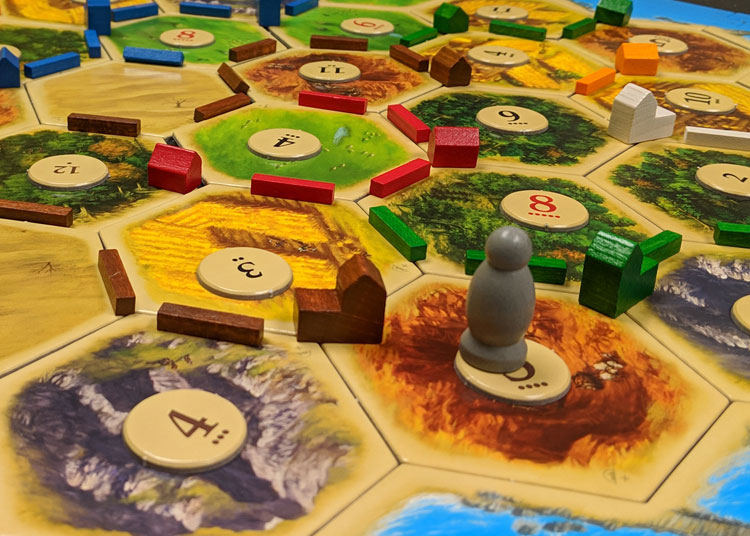What If... John Rawls was a Settler of Catan?
What If... John Rawls was a Settler of Catan?

When my family gets together over the holidays, we play a lot of games—card games, board games, sports, mental acuity games, just about anything. As my “kids” have grown into adulthood, I find myself struggling more and harder just to keep up. A great example is the well-known board game “Settlers of Catan.” For those unfamiliar with the game, it involves players initially choosing settlement areas on the board, which will provide them varying amounts of natural resources. The players then use those resources to develop their settlement areas and expand into neighboring settlements. The first player to accumulate a certain number of development points wins the game.
There is certainly a good bit of strategy involved in playing the game (what kinds of development to pursue, where to expand, which neighbors to attack, etc.), but as my children had to point out to me, the original choice of settlement areas plays a huge role, also. It determines what kinds and how much natural resources a player has access to (it really is embarrassing to have to depend on one’s offspring to point that out, especially for a strategy instructor). And, given that the order of choosing settlement areas depends on some unrelated factor, such as age, weight, earliest birth date, or some other criterion), the best sites get taken by those choosing first.
After noting that the players who were last to choose often did poorly in the ensuing game, we decided to make a seemingly minor change in the rules of the game. We continued to make our original site selections, as the game instructions specified. But we added one crucial step before starting the game. One of the players would roll a die, and based on the number that came up, the players would physically move that many spaces around the table (left or right, either way works), effectively taking over the settlement choices of another player. Or, if the number on the die is the same as the number of players, each person used his or her own selection. Thus, each player still must employ sound strategy during the game, but her supply of natural resources is more dependent on chance than her order of selection.
I typically still lose badly to my “kids” and their partners, but at least now I know that is due to my own deficiencies rather than a random chance of selection position. After playing with this new rule, it finally occurred to me that this game has significant social implications. Being the last person to select settlement sites is eerily similar to being born with a certain skin color, religion, sexual orientation, or the like. Through no fault of one’s own, that person is systematically denied access to certain vital resources and opportunities, thus largely determining one’s life outcomes.
It also occurred to me, that completely unknowingly, we had honored John Rawls’s seminal idea, the “justice as fairness” political philosophy. Rawls was an American moral and political philosopher who taught and wrote at a variety of Ivy League schools. As a political philosopher, Rawls wrote in the “social contract” stream of thought. Social contract theorists try to understand and explain how and why individuals—who were often thought to be selfish, power seeking, and interested in personal gain—originally agree to band together and form some type of social structure to govern themselves. Thomas Hobbes, John Locke, and Jean-Jacques Rousseau are probably the best-known philosophers in this strain. Hobbes, in particular, is noted for his descriptions of society prior to such a contract as “a war of all against all” and individuals’ lives then as “nasty, brutish, and short.” Although these philosophers held different views of human nature, and the reasons why individuals banded together into societies, their common goal was to explain that transition.
One of Rawls’s greatest contributions to political philosophy was his thought experiment, “justice as fairness,” in which he tried to understand how a society could best design itself, so that it would be the most fair. Keeping in mind that it took Rawls nearly 600 pages to describe his ideas, a very concise description is that he imagined pre-societal people in the “original position” of deciding the rules of a society they would form. Those people would be behind a “veil of ignorance” in which they had enough information to understand basic scientific and social concepts, and cause-and-effect relationships, but were ignorant of their own characteristics or place in the society. Given these circumstances, Rawls postulated that people would design their societies using the “maximin” principle, so that the least advantaged members of society (the “…min” part of the principle) would have the maximum potential benefit. Furthermore, his “difference principle” says that differences in social status, income, power, etc. are justified only if those differences help the least advantaged more than they do the most advantaged. Overall, Rawls’s conception of a fair social contract would be one not conceived to benefit one’s self, but to provide more opportunity for those at the bottom of the social scale.
Contrast the potential outcomes of Rawls’s social contract process with the popular notion of the formation of the United States. The individuals writing the Constitution were exclusively landed white males who wrote the rules with their own interests specifically in mind. Meaningful participation in American society would be denied to poor white men, all women, all blacks, and all native people. Even though rights have gradually been extended to individuals beyond the original defined group, wealth and power is still clearly concentrated among the descendants of the initial “in-group.”
With American society experiencing rapidly growing inequality in income, wealth, and power, it may be time to go back to Rawls’s work, and think about how we can re-design our society to be more like the VanSandt version of Settlers of Catan.
The views and opinions expressed are those of the author and do not imply endorsement by the University of Northern Iowa.




